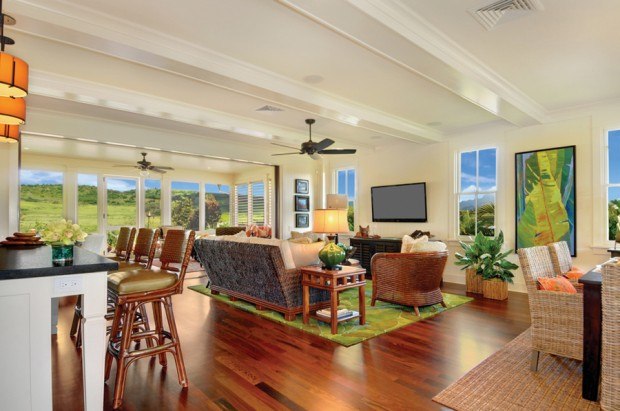LIHU‘E — It’s one thing for a builder to say they are using environmentally friendly materials, but it’s another to be certified to have an advantage with consumers who seek out builders with special knowledge and skills for new construction
LIHU‘E — It’s one thing for a builder to say they are using environmentally friendly materials, but it’s another to be certified to have an advantage with consumers who seek out builders with special knowledge and skills for new construction and renovations.
The Leadership in Energy and Environmental Design offers a class for builders on June 26-27, from 8 a.m. to 4:30 p.m. at Kaua‘i Community College. Once a builder or designer passes the certification exam they are in compliance with various rating systems including the Environmental Protection Agency.
“Both the college and WorkWise Kaua‘i have funding for the project that will make it free for participants,” John Bendon, a building analyst and certified energy rater. “It’s a pretty amazing opportunity for folks to get some cutting-edge training for free without having to travel.”
Unlimited Builders LLC is constructing 15 LEED-certified custom homes at Kukui’ula in Po’ipu. The Kukui’ula Club Cottages are a luxury residential development.
“It is going to be the very first LEED for homes project on Kaua‘i,” Bendon said. “The project is part of the Kukui’ula master plan.”
The technology includes green-friendly insulated walls and roofs with special windows to keep the houses cooler. Other efficiencies include low-flow shower heads, faucets, toilets and landscape irrigation systems.
There will be timers on air conditioning and fans throughout the home. All appliances are Energy-Star-rated, and wood flooring comes from certified forests approved by the Forest Stewardship Council.
The sustainable design landscaping around the cottages has no invasive species and trees and shrubs are at least 24 inches away from the buildings to prevent pests from accessing roofs.
“We are dedicated to sustainability and to environmental stewardship. We look forward to the future owners of these homes being able to maintain a smaller carbon footprint,” said Unlimited President Jay Manzano in a press release.
Award-winning Unlimited projects on O‘ahu include Safeway Beretania and the Kapolei Judiciary Complex. It is currently building 64 affordable apartments at ‘Ewa Village.
“By following LEED recommendations, we are creating homes that will save energy for individual homeowners and for our planet. It’s a win-win situation for all of us,” Manzano said.
LEED for Homes is a third-party certification system for building and designing high-performance green homes that are energy and resource efficient and healthy for occupants. It was developed in 1998 and is administered by the U.S. Green Building Council, a nonprofit membership organization working for a sustainable built environment within a generation.
The LEED certification has become more important in recent years with more knowledgeable consumers wanting to build efficiently but also with less of an environmental footprint. More people want to select certified a builders listed in the LEED ratings directory to ensure they are complying with Green standards.
Funded by the State Energy Sector Partnership, the LEED certification course studies the four categories of building and home design and construction, interior design, building operations and maintenance, and neighborhood development.
Points are earned attention to sustainable sites, water efficiency, energy and atmosphere, materials and resources, indoor environmental quality, design innovation and regional priorities.
Bendon is the principal and president of Green Building LLC on Maui. He said the course provides a an introduction to sustainability, green building’s relationship to sustainability and core concepts in green building. It is open to the community; interested participants need to register for the course.
The second day preparation workshop is to help builders learn about the industry and pass the LEED Green Associate exam. It includes an in-class practice exam and a take-home test that accurately reflects the actual test.
“The training is designed to teach what is green, what it means in Hawai‘i, and how to pass the test to be a LEED Green associate with that designation on your business card,” Bendon said.
The certification tells the consumer that the builder is qualified in the area of environmentally sensitive building. Bendon said it adds a level of confidence that a project is in compliance behind the scenes, from the suppliers to the contractors and subcontractors.
Bendon said there are a number of third-party certifications that took place at all phases of design and construction. He said that with all the good intentions, the good stewardship practices would be carried out on a large scale with making it a requirement.
Certification means that architects ensure the demand for tropical hardwoods will require Epay lumber, certified as a natural renewable resource. Bendon said this means that lumber comes from a good steward and doesn’t contribute to rapid deforestation of rain forests.
“There is a multi-billion-dollar black market lumber trade,” Bendon said.
The training is $495 for USGBC Hawai‘i chapter members and $550 for non-members. The course, including exam, is $850.
Scholarships are available through SESP Grant applications, funded by the American Recovery and Reinvestment Act and made available through the U.S. Department of Labor. Apply online at http://sesphawaii.com or contact Adele Manera at WorkWise Kaua‘i, 274-3056 or Adele.S.Manera@hawaii.gov.
To register for the course, call 283-2183, email Patty@GreenBuildingHawaii.com or visit www.GreenBuildingHawaii.com/classes.html.
For more information on LEED for Homes, go to www.usgbc.org.



